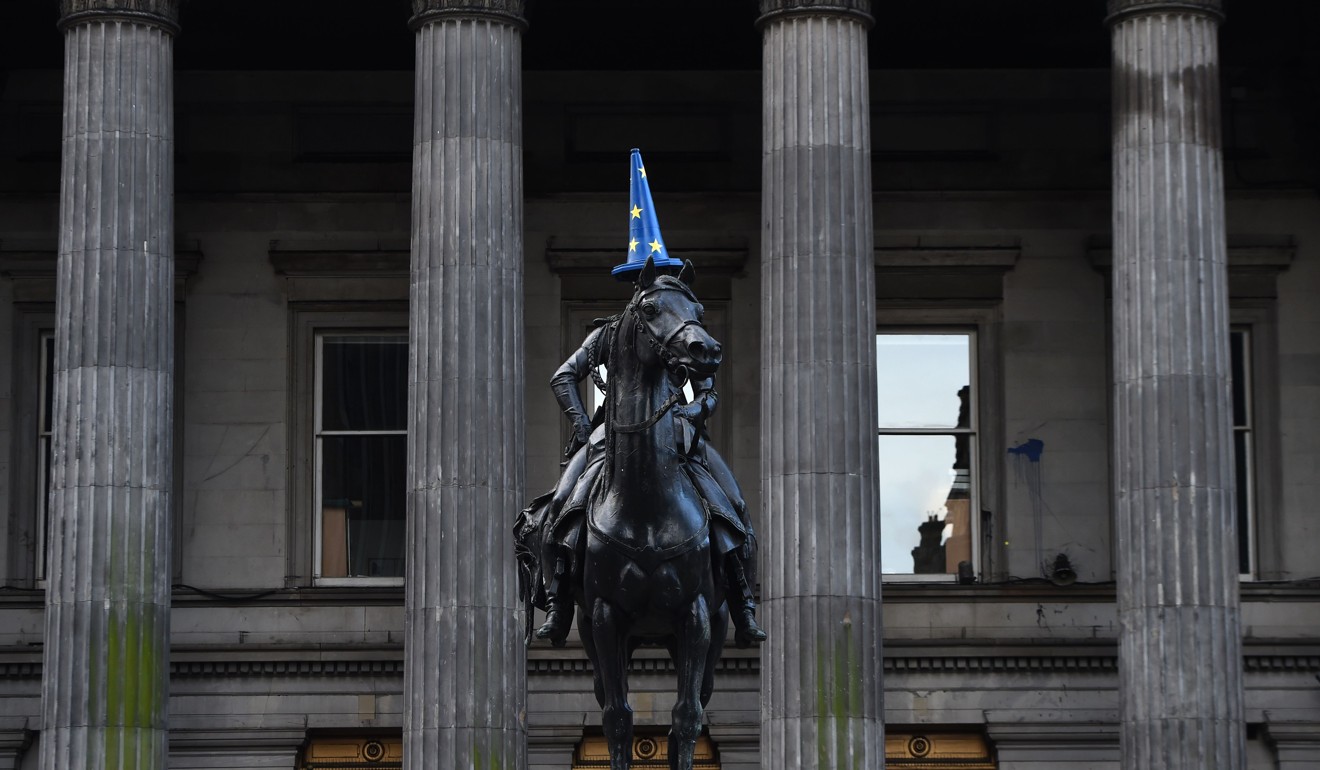
IndyRef2: Brexit boosts Scottish movement to end London’s rule
- Scotland’s nationalist First Minister Nicola Sturgeon wants to hold another referendum but British Prime Minister Boris Johnson has refused permission
- New poll suggests slim majority of Scots now in favour of the country ending its three-centuries union with UK
Now that the UK has finally left the EU, one of Prime Minister Boris Johnson’s next battles will be to resist moves from north of the border for a new independence referendum.
According to a poll by YouGov published on the eve of Brexit, 73 per cent of people in Scotland wanted to remain in the EU, up from 62 per cent in the 2016 Brexit referendum.
However, Scotland can’t just unilaterally break away. In order for a newly independent country to join the EU, it needs to have had the permission of the country from which it secedes.
Opposition to Brexit has boosted calls for a second Scottish independence referendum, known as IndyRef2, after 55.3 per cent said no to succession in a referendum nearly six years ago.
The margin is still tight, with a recent poll showing 51 per cent of the Scottish electorate now in favour of leaving the UK, but Scottish politicians are convinced the “leave” constituency could quickly grow because of Brexit. On Sunday Scotland’s main unions lent their support to IndyRef2.
It was the decision to leave the EU that has increased the power of Scottish nationalists, who have proved to have been some of the most articulate opponents to Brexit.
The Scottish National Party (SNP) was rewarded in last December’s general election, where it increased its vote by 13 per cent to become by far the largest party in Scotland with 45 per cent of the Scottish vote, increasing its seats at Westminster. The Scottish Conservatives, whose election campaign urged voters to reject SNP calls for IndyRef2, lost seats.
Brexit at last: Britain leaves EU for an uncertain future
The SNP-dominated Scottish Parliament has already sought London’s approval to hold another referendum in 2020, but he has given a categorical “no”, referring to the 2014 vote as a “once in a generation chance”.
On January 31, a few hours before Brexit, Nicola Sturgeon, Scotland’s first minister, repeated her desire for independence. If consent was not granted a vote this year, she said the SNP would call for a referendum mandate at the Scottish Parliament elections in May 2021.

“We were told in 2014 that if we stayed in the UK we would be staying in Europe so the UK that we were told we were staying in no longer exists,” Ian Blackford, leader of the SNP in the Houses of Parliament told the BBC.
“It is up to us now to make sure that Scotland has got that right to have a say in its future, that we have that referendum and we’ve got a road map that takes us back into Europe, that we create a destination for Scotland in Europe, one where we can build a strong economy, one where we can deliver fairness and one where we can take our climate responsibilities.”
Sturgeon, who has not ruled out a court challenge for the right to hold a consultative referendum if London continues to deny requests for another poll, ended a farewell letter to the EU with the words: “Leave a light on for Scotland”.
“I believe that Scotland has the right to choose its own future and that the best option for Scotland is to be an independent country, in the EU,” she said.
To mark Brexit night, the Scottish parliament at Holyrood in Edinburgh was lit up in the colours of the EU flag as candlelit vigils were held across the country.
But would the EU take Scotland, even if the UK lets it go?
There is no doubt there is sympathy in Brussels for the plight of the Scots, especially among the smaller countries.
Larger countries like France and Spain are concerned it could galvanise independence movements in Corsica, the Basque country and the independence-minded Spanish region of Catalonia.
“The EU was reluctant to intervene in the 2014 vote, not wanting to be seen as interfering in the domestic affairs of an EU member state,” explained Coree Brown Swan, a post-doctorate researcher on Brexit at the University of Aberdeen.
Few parallels in Catalonia with events in Hong Kong
“The Catalan situation is quite different from the Scottish case though. In 2014, the UK and Scottish Government agreed on the terms of a referendum. However, it remains unclear how they would respond to an independent Scotland’s application for membership, or indeed, if Scotland would seek full membership of the EU, given that this might create barriers for trade between Scotland and England.”
Scotland would also have to massively improve its economy, which is currently bracing from Brexit.
According to a report published last year by the Fraser Allander Institute at Strathclyde University, Brexit could have the effect of reducing employment by between 30,000 and 80,000 jobs in Scotland over the next decade.
Since the referendum it has however been moving closer to Europe, increasing its exports to the 27 member states. It is also increasing trade with other countries, including China.
The third-largest UK export to China in 2018 – after gold bullion and Land Rover vehicles – was £4 billion (US$5.2 billion) of petroleum, extracted from the North Sea off the coast of Scotland by the state-owned China National Offshore Oil Corporation.
But the rest of the UK is still by far Scotland’s main trading partner, with exports estimated to be £51.2 billion in 2018.
If Scotland was to leave the EU, it would have to erect a hard border with England, something it may not want to do.

“If an independent Scotland joins the EU, that could lead to a hard border between Scotland and England, a proposition that would scupper any realistic chance of winning a second independence referendum,” Alex Neil, the only SNP parliament member to have admitted voting for Brexit, wrote in Scotland’s The Herald newspaper last week
“Until the UK-EU free trade agreement, or no agreement, is known it is not possible to finalise a policy. However contingency planning is sensible, and one possibility stands out – Scotland joining the European Free Trade Association (EFTA).”
EFTA countries – Switzerland, Iceland Norway and Lichtenstein – operate within the European single market but are not considered part of the customs union, meaning there would not be a need for checks on the border between Scotland and England.
The EFTA block also in the Schengen Area, meaning the free movement of people would be preserved.
Additional reporting by Reuters

